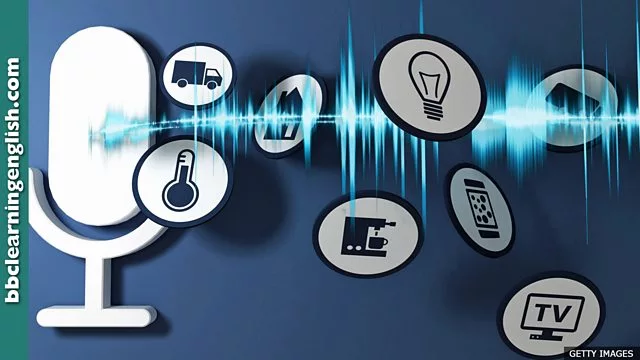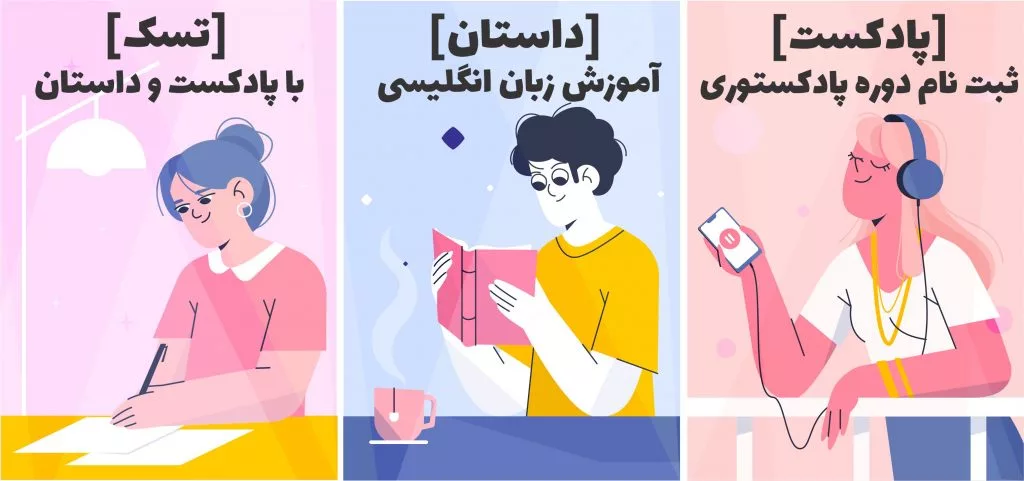پادکست انگلیسی BBC – ربات
در این قسمت درباره رباتها یا پشتیبانهای سخنگو صحبت میشه. بیشتر افراد با ماشین صحبت می کنند – به طور خاص ، پشتیبانهای مجازی یا رباتها. انجام این کار آسان است زیرا اغلب می توانید آنها را در تلفن هوشمند ، رایانه یا حتی بلندگو در خانه خود پیدا کنید. راب و دن درباره چگونگی تغییر تعامل ما با فناوری و نوع زبانی که ما استفاده میکنیم بحث می کنند (نظر خودتون رو به انگلیسی در بخش دیدگاه با ما در میون بذارید!) در پادکست انگلیسی BBC – ربات می شنویم که دن و نیل درمورد این موضوع صحبت می کنن و در طول مسیر کلمات جدیدی هم آموزش میدن.
سوال پادکست انگلیسی BBC – ربات :
When was the first computer which could recognise speech, launched? Was it in:
a) 1951
b) 1961
c) 1971
به پادکست خوب گوش کن تا جواب رو پیدا کنی.
اگر می خوای گوش دادن به پادکست تا حد امکان برات ساده و کارآمد باشه مراحل زیر را دنبال کن:
هر روز به پادکست گوش کن. وقتی براش یه وقت ثابت در روز در نظر بگیری برات تبدیل به عادت میشه و این عادت هرروز پیشرفت میکنه.
پادکستی رو پیدا کن که موضوعش برات جالب باشه. وقتی از خود موضوع لذت ببری یادگیری هم برات لذتبخش میشه.
به پادکستی گوش کن که transcript یا متن داره. این بهت کمک می کنه تا کلمات و عبارات جدید رو به سرعت در متن پیدا کنی و ساختار انواع مختلف جمله رو خوب یاد بگیری.
پس از گوش دادن به پادکست با متن، در مرحله بعدی سعی کن بدون نگاه کردن به متن این کار رو انجام بدی. این کار مهارت شنیداری رو تقویت می کنه و کمک می کنه تا انگلیسی زبانان بومی را راحت تر درک کنی، حتی اگر خیلی سریع صحبت کنن.
اگه به پادکست انگلیسی گوش کردی و نتونستی کامل متوجه اش بشی، ناامید نشو. پادکست هایESL -English as Second Language بیشماری وجود دارن که برای سطوح مختلف، از ابتدایی تا پیشرفته طراحی شدن. مطمئنا هر روز می تونین یه پادکست مناسب با سطح خودت پیدا کنی.
فراموش نکن که هرچی بیشتر تمرین کنی در اون مهارت رشد میکنی! به قول انگلیسی ها: Practice makes perfect
واژگان کلیدی پادکست انگلیسی BBC - ربات
| معنی به فارسی | معنی به انگلیسی | واژه |
| مکالمه غیررسمی در مورد چیزهای بی اهمیت | informal conversation about unimportant things | chit-chat |
| تا این لحظه | up until this moment in time | to date |
| چیزی که باعث تغییر می شود | something that causes change | agent |
| توانایی تفکر ، تصمیم گیری و مستقل عمل کردن | kind and helpful | agency |
| زبان بومی | native language | vernacular |
| توانایی تفکر ، تصمیم گیری و مستقل عمل کردن | very direct, not very polite | brusque/to the point |
BBC 6 minute English -Talking to machines

برای دانلود پادکست روی سه نقطه سمت راست کلیک و گزینه Download را انتخاب کنید.
متن پادکست انگلیسی BBC - ربات
Rob
Hello and welcome to 6 Minute English. I'm Rob.
Dan
And I'm Dan.
Rob
Hey Dan. What’s the time?
Dan
Time you got a new watch?
Rob
Now I didn’t ask you that just for a joke or a sarcastic comment now did I?
Dan
Well no, but look there’s a clock over there, you are wearing a watch, you have a smartphone and a computer, all of which show the time. So why are you asking me?
Rob
Dan! I was trying to introduce today’s topic which is all about virtual assistants or bots. You seemed to have forgotten the script.
Dan
Oh yes, sorry. We’re talking about software that you talk to and that can talk back to you. Like Apple’s Siri, Google’s Assistant, Amazon’s Alexa and Microsoft’s Cortana. It might be on your phone or computer or even a speaker in your house.
Rob
Now before we hear more about this topic, here is today’s quiz question: Do you know when was the first computer which could recognise speech, launched? Was it in
a) 1951
b) 1961
c) 1971
Dan
I have found my script, so I’ve seen the answer but I have to say I was surprised.
Rob
Don't tell anybody Dan, OK. We’ll give the answer for the listeners at the end of the programme. We’re going to hear now from Tom Hewitson, who is a conversation designer, working in the field of virtual assistants, talking on BBC Radio 4's Word of Mouth programme. He talks about the whole idea of virtual assistants and how they are changing the way we interact with technology. How does he describe our existing relationship with computers?
Tom Hewitson, Conversation Designer
It changes the way that we think about computers. To date we’ve thought of them largely as tools. They’re just an advanced version of a calculator. They’re something you kind of use to get a specific thing done, whereas this is kind of changing them more into like an agent. They’re an active participant in the interaction and in guiding you to make the right decision.
Rob
How did he describe our existing relationship with computers then?
Dan
He said that to date, which is an expression which means 'up until this point in time', we have thought of them as advanced calculators.
Rob
Yes, that’s right, we use them as a tool to get things done. But he says that modern technology is turning them into an agent. This doesn’t mean a secret agent, like James Bond! In this sense an agent is something that has agency and that means it has the ability to act individually and make its own decisions.
Dan
I’m not sure I’d like my phone to have agency. It probably wouldn’t like being in my pocket all day.
Rob
Who would Dan? But I’m not sure Hewitson is suggesting our devices would become that clever but he did say they could become more active in our lives.
Dan
Maybe. I imagine, for example, telling us if we are spending too much time in fast food restaurants?
Rob
Maybe in your case Dan. Mine would be telling me I spend too much time in the gym! Hewitson goes on to explain how the way we will talk to our virtual assistants will develop. What does he say we don’t need to do?
Tom Hewitson, Conversation Designer
We will develop our own kind of vernacular for speaking with machines that will be subtly different from how we speak to other people because as you rightly point out you don’t need to make the machine like you don’t need to kind of make random chit-chat that’s just filling the time. It can be much more brusque and to the point.
Dan
A lot of what we say in human communication is to do with our relationship with the person we’re talking to.
Rob
We say things and talk about things that are maybe not directly relevant to our point. With a digital virtual assistant, we don’t need to do that, so we don’t need to make the machine like us.
Dan
Hewitson said that we will develop our own vernacular, this is a general word for a native language. This vernacular will be a little bit different from our everyday vernacular because, as we said, we don’t need to maintain a social relationship with the artificial assistant.
Rob
This means that we won’t need chit-chat. Chit-chat is another expression for small talk: conversation topics which aren’t important but are part of everyday social communication, like talking about the weather.
Dan
And because we don’t need to be friends with our virtual assistants, we can be brusque and to the point. Both of these mean being very direct and not very polite.
Rob
Well Dan, I don’t mean to be brusque but it is time for the answer to this week’s quiz question. Earlier I asked when was the first computer which could recognise speech, launched. The options were:
a) 1951
b) 1961
c) 1971
Well actually the first computer which could recognise speech was launched in 1961.
Dan
It was called the IBM Shoebox and could recognise 16 words and the numbers zero to nine. That’s nearly as many as you!
Rob
Cheeky! Right enough of this chat-chat. Let’s recap today’s vocabulary.
Dan
Well chit-chat was one of today’s expressions. Meaning 'small talk', but we also had the expression to date. That means ‘up until this moment in time’.
Rob
Then we had the noun agent. This refers to something that has agency. And that is the ability to think, make decisions and act independently.
Dan
The next word is vernacular, another word for language, particularly when talking about a native language.
Rob
And finally there was brusque meaning 'direct and not polite' and to the point, which also means 'direct and without unnecessary information'.
Dan
Hey Rob
Rob
Yes, what can I do for you Dan?
Dan
End the programme.
Rob
Certainly Dan. Well that’s all from us today, be sure to check us out on all the usual places: Facebook, Twitter, Instagram and YouTube, and of course please don't forget our website bbclearningenglish.com. Bye for now!
Dan
Bye!
امیدوارم از پادکست انگلیسی BBC - ربات لذت برده باشید.
گوش دادن به پادکست روش خوبی برای تقویت مهارت شنیداری و هم چنین یادگرفتن کلمات در بستر یک موضوع خاصه که این به تقویت مهارت مکالمه انگلیسی نیز کمک زیادی می کنه.
اگه تو هم از اون آدمهایی هستی که از گوش دادن به پادکست لذت می بره برات یه خبر خوب دارم! آموزشگاه زبان انگلیسی ۲۴talk یه دوره طراحی کرده مبتنی بر پادکست و داستان کوتاه به اسم "پادکستوری - Podcastory". این دوره سعی کرده یادگیری زبان انگلیسی رو مناسب با نیاز و سطح زبان آموز به یه فرایند بسیار مفرح، موثر، سریع و کم هزینه تبدیل کنه.
همین الان می تونی با کلیک روی عکس زیر و ثبت نام در دوره ی آموزش زبان انگلیسی با پادکست و داستان ۲۴talk اولین و مهم ترین قدم رو برای یادگیری زبان انگلیسی برداری. وقت رو از دست نده!
دوره پادکستوری آکادمی مجازی ۲۴talk
برای شنیدن دیگر پادکست ها، به بخش پادکست در مرکز آموزش رایگان مراجعه نمایید.








